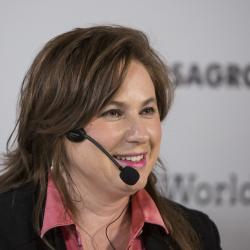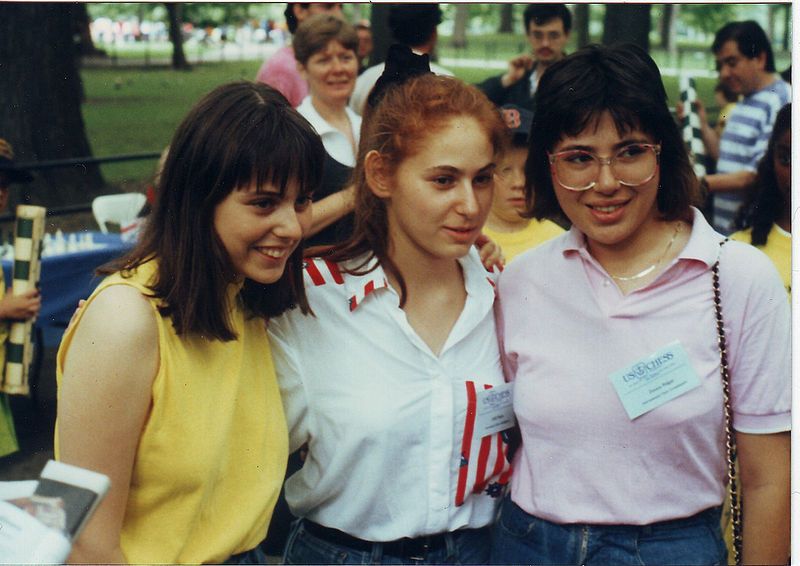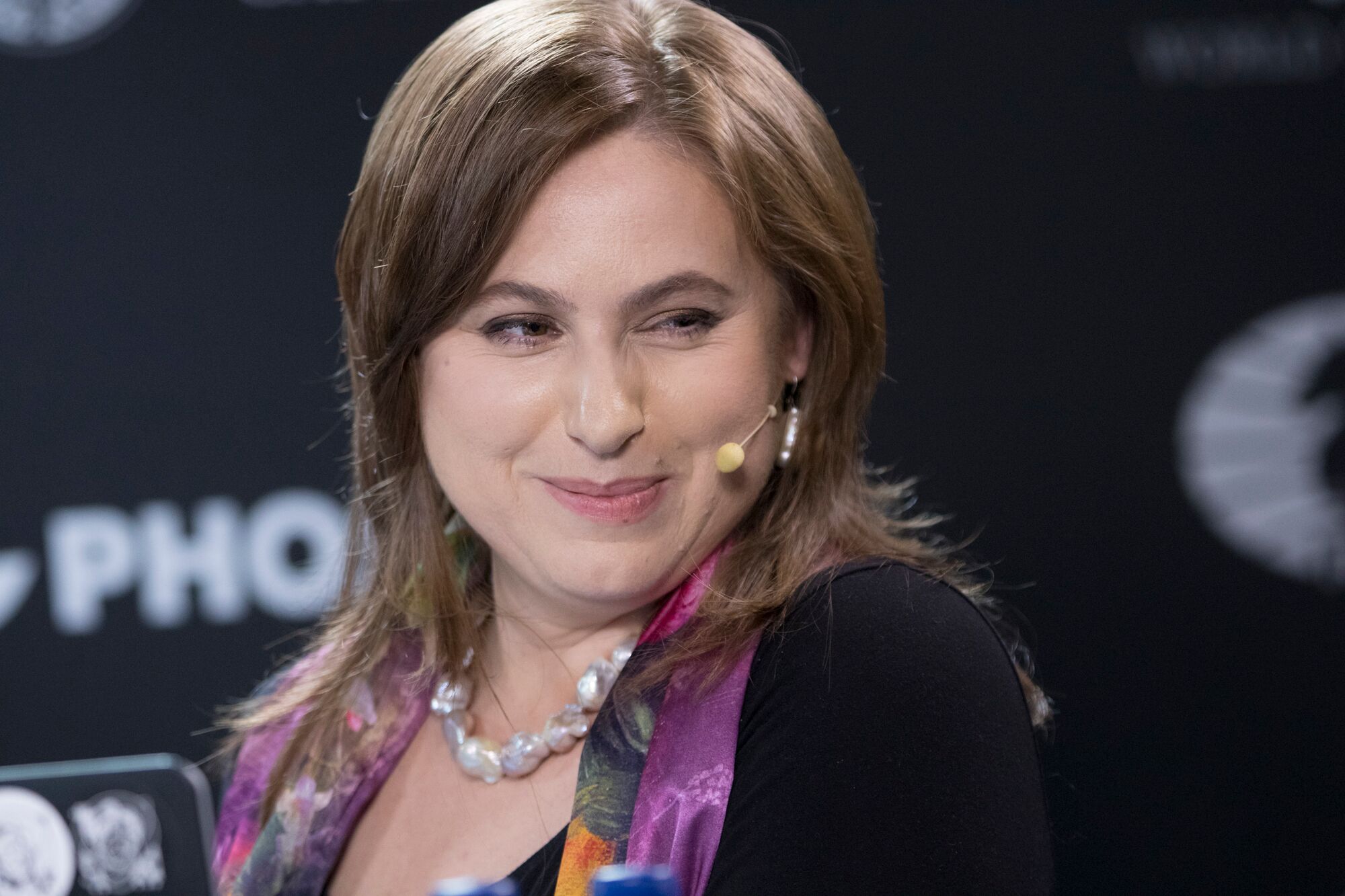GM Judit Polgar

Bio
Judit Polgar is the greatest female chess player of all time, and there’s virtually no debate about that. There isn’t really anyone else to contend with her, either. As people argue whether Garry Kasparov or Magnus Carlsen is the best-ever player, Polgar is clearly the best woman to have ever played the game. Not only has she beaten both of those all-time greats, but Polgar has defeated other world champions like Anatoly Karpov, Viswanathan Anand, Boris Spassky, Vladimir Kramnik, Ruslan Ponomariov, and Veselin Topalov.
Polgar is the only woman to have crossed the 2700-rating threshold that many consider as the “Super GM” distinction. She’s the only one to have defeated a number-one ranked player in the world. And in 1991, at the age of 15 years and four months, she broke Bobby Fischer’s record of being the youngest grandmaster in history (now held by Abhimanyu Mishra).
From the time Polgar was 12, she was the top-ranked female player in the world for more than 26 years, all the way up to her retirement in 2014. Her peak ranking was No. 8 in the world and her peak rating was 2735. Now retired, Polgar will remain the best female chess player in history until further notice.
- Youth and Early Career (1985 to 1991)
- The Youngest Grandmaster Ever (1991 to 1997)
- The Greatest Female Player of All Time (1997 to 2002)
- Defeating Kasparov (2002 to 2004)
- Returns to Competition (2004 to 2014)
- Legacy
Youth and Early Career (1985 to 1991)
At the age of nine, Polgar won her first international chess tournament. But her journey in chess started much earlier when Judit, along with her sisters Susan Polgar (a GM) and Sofia Polgar (an IM) were involved in an educational research project.
“Based on educational studies, our parents decided that their children’s lives and careers would be a living example, that would prove that any healthy child – if taught early and intensively - can be brought up to be exceptionally successful in any field,” Judit wrote on her personal website. “In our case, this meant having a chess career.”
Judit Polgar’s parents decided that she would be a chess champion. And of course, that would become true. At seven years old, Judit played blindfolded against a master and won. Two years later, she won the unrated section of the New York Open, which contained players of expert strength who hadn’t played in the United States yet. Grandmasters flocked to Polgar’s games, just to see the young child succeeding against her competition.
After winning her first international chess tournament at nine years old, 10-year old Polgar defeated an IM at a tournament in 1986, and it wasn’t long until she took the next step in her career. In 1988, Polgar made her first IM norm, took the under-12 boys’ World Chess Championship (she won the title again in the under-14 section two years later), and finished first ahead of GM Yair Kraidman in a tournament.
Those results helped her gain the international master title, making her the youngest player at the time to become an IM (GM Praggnanandhaa now holds the record at 10 years and 10 months of age). That feat caused Mikhail Tal to say that Polgar could be the men’s world champion, as she became an IM much younger (at the age of 12) than both Fischer and Kasparov (both were 14 years old).

Polgar also had a lot of success in Olympiads during this period. In 1988, at the age of 12, she played with her sisters for Hungary’s women’s team, and Judit scored an impressive 12.5 points out of 13 on board two, earning individual gold. The national team won gold as well, the first in the history of Hungarian chess. In 1990, Judit once again led the (same) national team to gold; she won individual gold as well. It would be the last women’s-only tournament that she played in.
Polgar became the top-ranked woman player in the world in 1989 (at 12 years old), which lasted into her retirement more than 26 years later. She entered the top 100 players in the world before turning 13 years old. “Judit Polgar's recent results make the performances of Fischer and Kasparov at a similar age pale by comparison,” the British Chess Magazine said at the time.
The Youngest Grandmaster Ever (1991 to 1997)
In 1991, Polgar won the Hungarian National Championship and received the grandmaster title at the age of 15 years and five months. It beat Bobby Fischer’s record (now held by Abhimanyu Mishra) by a month.
Polgar had several impressive performances in her early career as a GM. In 1992, she tied with GM Vladimir Epishin for second behind Anatoly Karpov at the Madrid International, and tied with Evgeny Bareev for first at the Hastings Christmas Chess Festival. The next year, she won an exhibition match against former World Champion Boris Spassky with 5.5 points out of 10. And then, in 1994, she won a Super GM tournament, the 3rd Torneo Magistral, with an undefeated score of 7/9 points. The field included Alexei Shirov, Gata Kamsky and the second-place (5.5/9) Ivan Sokolov. Later that year, she finished third in an elite tournament that included Shirov, Kamsky, Karpov and Viswanathan Anand.
The Greatest Female Player of All Time (1997 to 2002)
In early 1997, Polgar played in the 14th Annual Linares Super Tournament, finishing fifth in a field of 12 strong GMs. Half of the field was rated at least 2700 and Polgar was the second-lowest rated player. Yet, she played well, finishing with 6/11 points in fifth place. Polgar placed ahead of two of the four top-rated players, Vishwanathan Anand (rated 2765) and Vassily Ivanchuk (rated 2740), and her 19-move miniature against Ivanchuk was a highlight of the tournament. Five months later, Polgar played in the 25th Dortmund International Chess Tournament where she finished in fifth place ahead of the legendary Anatoly Karpov, as well as Boris Gelfand and Nigel Short.
The next month, Polgar was recognized for making her mark in the chess world. “There has long been a lively debate about who is the strongest player of all; prominent candidates are Bobby Fischer, Garry Kasparov, Jose Raul Capablanca, Alexander Alekhine or Emanuel Lasker,” Robert Byrne, legendary grandmaster and columnist for The New York Times, wrote in August 1997. “But there is no argument about the greatest female player: she is 21-year-old Judit Polgar of Hungary, the youngest of three amazing sisters.”
In that column and across other publications, Polgar was officially recognized for what she’s still known for being, and that’s the greatest female chess player of all time. As Byrne noted, “Polgar is the only woman ever to consistently compete on equal terms with the top 20 players in the world.” Of course, all of what Byrne wrote is still true.
Polgar continued to compete at the highest stage of chess competition during this part of her chess career. In ’98 at Wijk aan Zee, she finished in the middle of the field made up of top GMs, alongside Karpov, Veselin Topalov and Jeroen Piket with 6.5 out of 13. Viswanathan Anand shared the tournament victory and Polgar was the only one to beat him. The same year, she played current FIDE World Champion Karpov in an exhibition match, where she beat the champion twice and drew the remaining six games, winning with a score of 5-3. A few months later, Polgar became the first woman to play in the U.S. Open, and she shared first place with Boris Gulko.
Polgar became the first woman to play for the World Chess Championship in Las Vegas 1999, where she reached the quarterfinal round, losing to Alexander Khalifman, who later won the title. She took revenge against him in 2000, however, when Polgar won the Japfa Classic, an extremely strong tournament headlined by current Khalifman (the current FIDE World Champion) and the previous champion, Karpov. Those two shared second place (6/9) behind the undefeated Polgar (6.5/9). In 2001, Polgar played in another elite tournament, Linares, where Garry Kasparov won with 7.5 out of 10 points, and the other five players tied with 4.5 points. Notably, Polgar drew both of her games against the 2849-rated winner—faring better than anyone else (Karpov, Peter Leko, Alexei Shirov and Alexander Grischuk).
Defeating Kasparov (2002 to 2004)
Early in 2002, Polgar won an international event in Benidorm, Spain. She tied current FIDE World Champion Ruslan Ponomariov and then beat him in tiebreaks, winning the final blitz game in spectacular fashion. The tournament included other big names like Sergey Karjakin and Anatoly Karpov.
But the highlight of this period was later in 2002 when, in in a rapid match between Russia and the rest of the world, Polgar defeated Garry Kasparov for the first time. Never before had a woman beaten the world’s No. 1 in competitive play, and it showed. Kasparov resigned and then quickly left the venue through a passageway where media personnel couldn’t get to him. As for Polgar, she rightfully described the game as “one of the most remarkable moments of my career.”
One year later, Polgar had one of her best tournament results when she placed second—going undefeated in the event—behind Viswanathan Anand in Wijk aan Zee. Other players in the group included Evgeny Bareev, Alexander Grischuk, Vladimir Kramnik, Karpov and Ponomariov.
During this period, Polgar once again found herself as one of the top 10 rated players in the world.
Returns to Competition (2004 to 2014)
Polgar took some time off in 2004 and again in 2006 to give birth to her son and daughter. She sometimes struggled to regain her previous form, but consistently demonstrated what she was capable of during this period of her career.
For instance, during Wijk aan Zee in 2005, Polgar shared 4th place with Alexander Grischuk, Michael Adams and Vladimir Kramnik, in one of the most elite tournaments in the world. She played in the FIDE World Chess Championships 2005 (finishing last out of eight competitors) and then, in 2006, finished in fifth/sixth place in another top field. In the 2006 Essent Chess Tournament, Polgar scored 4.5/6, including two wins against the world’s top-rated player, Veselin Topalov.
More highlights came in 2010 and 2011. In 2010, she won the Ajedrez UNAM Quadrangular Tournament with a 6/8 score, defeating Vassily Ivanchuk 2.5-1.5 and Topalov 3.5-0.5, the second- and third-place finishers. The same year she took on David Navara in the Czech Republic, defeating the strongest Czech player of all time by a score of 6-2.
Two impressive tournament performances came in 2011. In the European Championship, Polgar tied for first and finished with the bronze medal on tiebreakers. The field was comprised of 393 players; 167 of them were GMs. Polgar also competed in the 2011 World Cup, where she made it to the final eight players before being eliminated by Peter Svidler, who won the tournament. Her defeat of the tournament’s No.1 seed, Sergey Karjakin, was a highlight for Polgar’s performance in the event.
In the 2012 Chess Olympiad, Polgar scored 7.5 out of 10 points while playing on board three, while earning a performance rating of 2744. It was the best result since a tournament in 2000. The same year she defeated Magnus Carlsen in a rapid game, adding to Polgar’s list of world champions that she has beaten (Carlsen won the title a year after his game with Polgar, in 2013).
In 2013, Polgar defeated Nigel Short in Chess.com’s Death Match 18. Her final score was 17.5 to Short’s 10.5, with Polgar winning the three-minute segment convincingly at 6-2. The next year, she won a silver medal with the Hungarian men’s team at the Chess Olympiad. Polgar then announced her retirement from competitive chess.
Later she accepted the position to lead the men’s team for Hungary. Polgar continues to be active in the chess community as a commentator, writer, lecturer and more. She has helped introduce chess into schools and has formed initiatives that utilize chess as an educational tool. In 2015, she received the Grand Cross of the Order of Saint Stephen of Hungary, which is Hungary’s highest decoration and originally an order of knighthood.
Legacy

To many people Polgar’s legacy is quite simple—she’s the best woman to every play the game of chess. But what she had done for chess and what she continues to do for chess is much greater than that.
Polgar has broken down misconceptions surrounding women not being able to compete with men in chess. Plus, her aggressive, tactical style at the board is so inspirational, people believe that the tendency women have to play chess aggressively is due to Polgar’s style alone.
It would be a mistake to think of her only as the greatest female chess player of all time. Her games on their own stand the test of time, and will remain influential to generations of men and women to come. And she still has a lot of chess wisdom to share, as her current work as a commentator, ambassador for chess in education, writer and much more will demonstrate.


